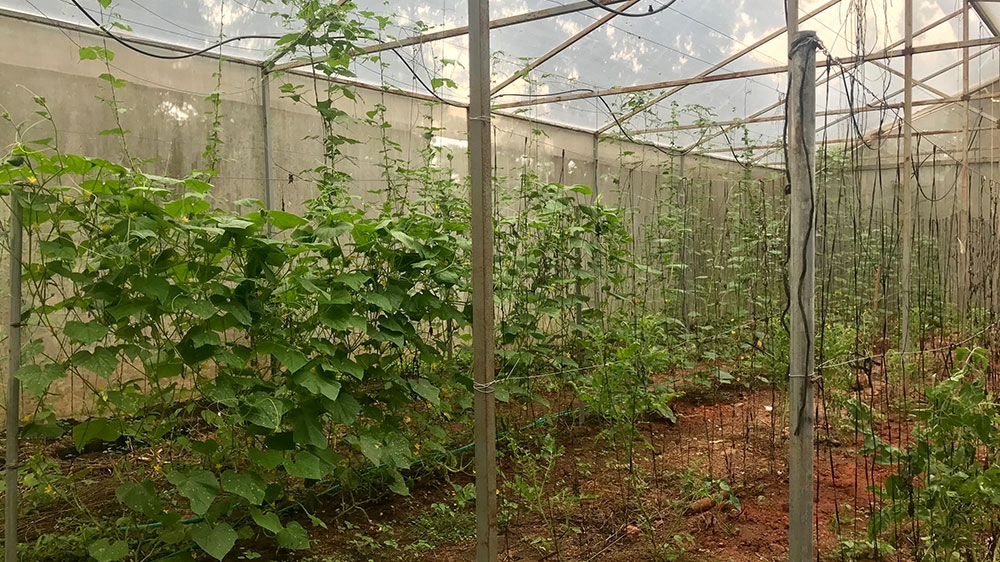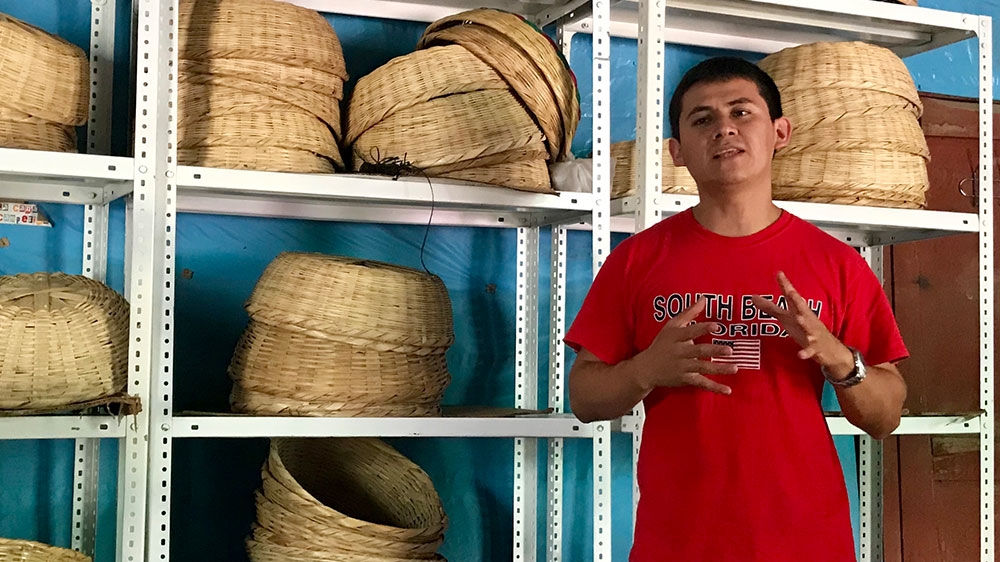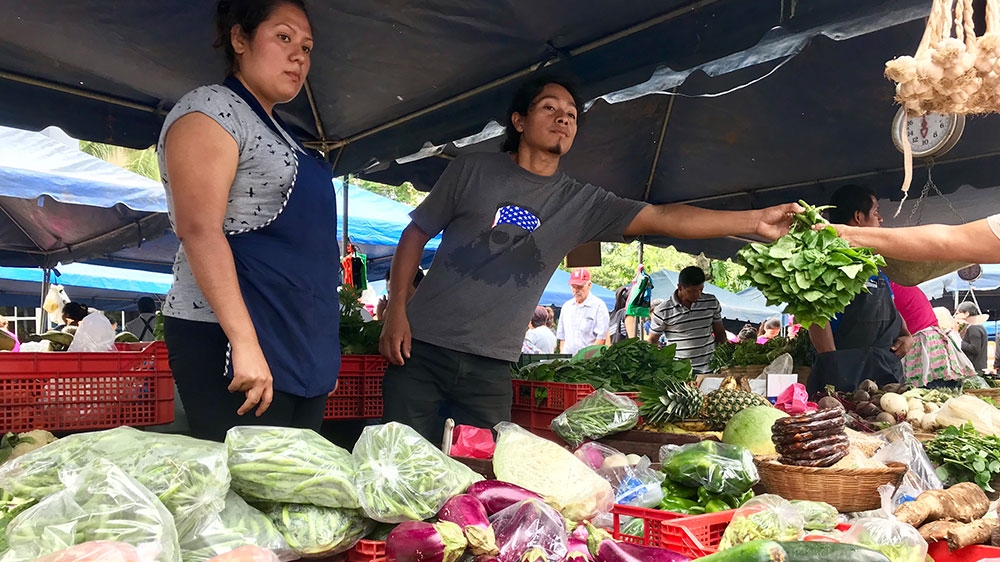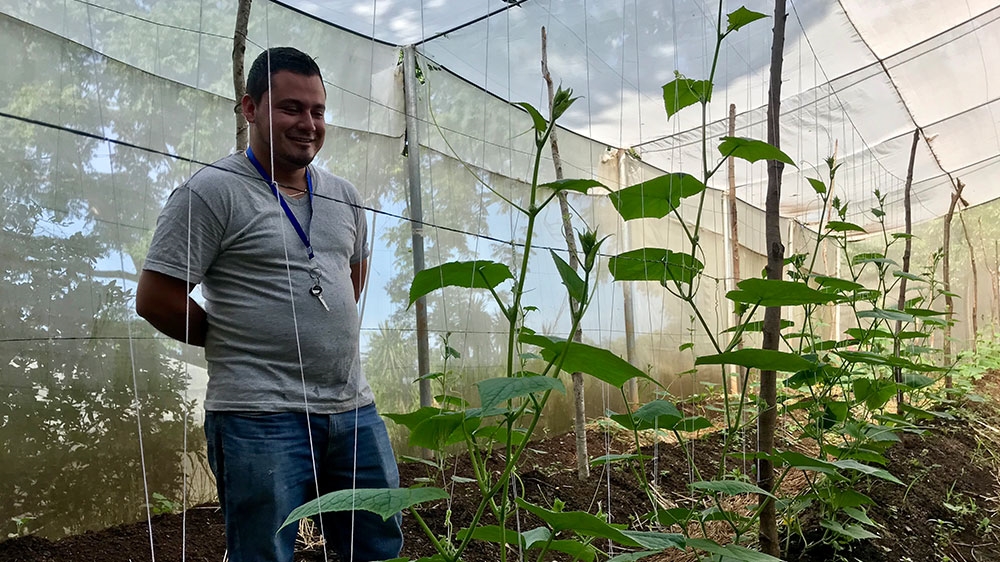El Salvador’s disappearing farmers
El Milagro, El Salvador – Cecilia Lopez loves breathing the fresh air in the countryside of El Salvador but, like many her age, the 18-year-old doesn’t plan on staying in her rural village much longer.
Balancing a heavy sack of fertiliser on her head as she descends the steep path leading to her family’s plot of corn, Lopez says she dreams of studying to become an accountant, or if she can get a scholarship, an aircraft engineer.
“We always need agriculture, but it’s not good as a business,” she says. “The vision of the youth here is to not continue with agriculture. It’s not sustainable.”
In her community of El Milagro, a tiny hamlet of fewer than 200 people nestled amid lush greenery about 50km northeast of the capital San Salvador, most families grow corn, beans, and other crops to cover their own needs and sell what is left over to make a meagre living.
While weighing her own options, Lopez also encourages her older brother to find an alternative that will help him get ahead without getting trapped in debt to guarantee harvests that might never pay off.
“Don’t be a farmer,” she tells him.
Their story is a familiar one among a generation of rural youth in El Salvador. Years of migration towards cities and the United States in search of work and sometimes to escape gang threats has left the country with an ageing population of farmers and many challenges to revitalising the sector.
According to experts, including the UN Development Program, the situation could affect food security in a country where nearly half of households are already food insecure.
Maria Santos, a 55-year-old organic grower selling a few baskets of produce at a vibrant market sprawled in the street in Nahuizalco, 70km west of San Salvador, also sees the trend.
“Here it’s rare for youth to want to farm now,” she explains, wedged between other subsistence farmers selling mostly similar products. “It’s worrying because as the elderly are dying, someone needs to be responsible.”
‘Livable rural areas’
According to the UN Development Program, the demographics of rural workers in El Salvador are “atypically” clumped in the 16-25 and over 56 age brackets. Government statistics indicate the average farmer age is 57.
Consultations by the International Fund for Agricultural Development suggest many young people around the world are not averse to rural life per se but want options that offer a quality of life beyond subsistence.
 |
| Plants in a greenhouse at an organic agriculture training centre in Suchitoto, Cuscutlan [Heather Gies/Al Jazeera] |
Wilfredo Rubio, adviser to the minister of agriculture, argues that the average age data likely does not offer a complete picture of farmer demographics. Nevertheless, he acknowledges that rural youth retention remains an important challenge.
“What we have to do is create attractive, livable agriculture that allows youth to feel good,” Rubio says. He stresses that the draw to cities isn’t just job opportunities, but also better access to basic services such as electricity, water, education, healthcare, recreation facilities, and telecommunications that may not reach the rural poor.
“Agriculture doesn’t get abandoned because it’s agriculture, it gets abandoned because of the conditions [in the countryside], and that’s what we need to transform,” he adds.
Government initiatives to support the sector include a scholarship programme for rural youth to study subjects like agronomy or beekeeping, financing for entrepreneurial initiatives, and efforts to promote agritourism.
Many believe more government support could give small farmers a much-needed boost. Older producers echo long-standing demands for agricultural subsidies, guaranteed land access, and increased technical support, while younger people often highlight the need for innovation.
In the US, where prohibitive farmland costs squeeze out young producers, the average age of farmers has also crept up in recent decades to 58.
‘Opportunities to experiment’
About 30km outside the capital, a cooperative organic agriculture initiative focused on creating opportunities for women and youth is bearing fruit.
The Canasta Campesina cuts out middlemen by selling local fruits, vegetables, eggs and herbs produced by small farmers directly to consumers in San Salvador in a bi-weekly farm basket.
Crates heaped with green onions, plantains, limes, cucumbers, eggplant, and other produce offer a glimpse of the initiative’s offerings at the cooperative’s headquarters in Comasagua, a town tucked among rolling hills about halfway between the capital and the Pacific coast.
Ever Valles, Canasta Campesina president, explains that the project, launched in 2012 with the help of international NGOs, aims to create a producer-consumer relationship based on fair prices and solidarity.
“Ninety-two percent of the vegetable sales goes straight to the campesino,” 26-year-old Valles explains, contrasting the project’s cooperative model to conventional markets where intermediaries gobble up a hefty portion of farmers’ profits.
 |
| Canasta Campesina President Ever Valles, 26, discusses the organic agriculture cooperative that sells produce grown by small farmers directly to consumers in the capital [Heather Gies/Al Jazeera] |
The Canasta Campesina is also looking to leverage technology by developing two new applications: an e-commerce tool to sell the produce baskets online and a “virtual library” to share agricultural knowledge between producers.
Valles says the technological innovation is not only attractive to youth, but also works towards bridging a digital divide that has traditionally limited small farmers’ access to technology and information.
Valles never saw a future for himself in his family’s subsistence agriculture. He left the community to find work close to the capital, but insecurity and violence soon forced him to return home.
I hope tomorrow there are people who stay to keep working [the fields]. Because in the end, even the richest people need agriculture.
Cecilia Lopez, 18-year-old aspiring aircraft engineer
He still didn’t know how he would make a living back in his village of El Cortes, a short drive away from Comasagua. His mother, one of Canasta Campesina’s 45 associates, encouraged him to get involved. Youth now make up a third of the cooperative.
For Valles, factors limiting youth involvement in agriculture include negative societal perceptions about farming, an education system that doesn’t encourage creative thinking, and authorities’ failure to listen to the needs of rural youth.
“Youth aren’t given opportunities to experiment,” he says, standing beside stacks of empty baskets ready to be filled with the next week’s produce.
He argues conditions will be better in the countryside when a farmer “isn’t seen as a day worker, but as someone who can make proposals.”
‘Necessity not vocation’
Rubio, adviser to the minister of agriculture, blames years of trade liberalisation under two decades of right-wing governments for undermining El Salvador’s agricultural sector by flooding the market with cheap imports and laying the foundations of an export-oriented model.
He claims the government’s hands remain tied by a conservative-dominated Congress. For years, business-friendly politicians have blocked proposed legislation that would boost state support for small-scale agriculture.
 |
| Cesar Sanchez, 26, selling at the farmers market outside the Ministry of Agriculture in Santa Tecla, just outside the capital [Heather Gies/Al Jazeera] [Daylife] |
Traditionally an agricultural economy, El Salvador has shifted in recent decades to depend much more significantly on the service sector and industry. Agriculture employed 19 percent of the workforce in 2017 compared to 38 percent in 1991, according to World Bank data.
For Brenda Rosales, 30, a facilitator with the ActionAid International-funded initiative Global Platform El Salvador, which focuses on building youth activism networks, structural change is an important piece of the puzzle.
She says many Salvadorans take on family responsibilities at a young age, forcing them to find work “not for vocation, but necessity”.
“If [youth] don’t see agriculture as a way to generate income – and fair income – they won’t be able to stay, they will always have to look for something else,” she says, stressing the need for political will to create favourable conditions for farmers.
 |
| Canasta Campesina Vice President Marvin Molina stands in a greenhouse where a member of the cooperative produces vegetables for the farm basket initiative [Heather Gies/Al Jazeera] |
Back in El Milagro, Lopez, the 18-year-old aspiring aircraft engineer who has helped cultivate her family’s crops as long as she can remember, believes the challenges likely run deeper than a lack of incentive programs or financing.
She says government handouts ultimately won’t remedy deteriorated farmlands or mitigate increasingly unpredictable climate factors that affect harvests.
But she also questions what fate youth in her generation are spelling for their communities. “What happens tomorrow when these people in agriculture are gone, thanks to us?” she ponders.
“I hope tomorrow there are people who stay to keep working [the fields]. Because in the end, even the richest people need agriculture.”
Reporting for this story was supported by the International Women’s Media Foundation as part of its Adelante Latin America Reporting Initiative.




